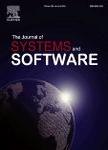版权所有:内蒙古大学图书馆 技术提供:维普资讯• 智图
内蒙古自治区呼和浩特市赛罕区大学西街235号 邮编: 010021

作者机构:Natl Univ Ireland JE Cairnes Sch Business & Econ Business Informat Syst Galway Ireland Radboud Univ Nijmegen Inst Management Res Heyendaalseweg 141 NL-6525 AJ Nijmegen Netherlands Radboud Univ Nijmegen Inst Management Res Ctr Org Restructuring Heyendaalseweg 141 NL-6525 AJ Nijmegen Netherlands Natl Univ Ireland Lero Irish Software Engn Ctr JE Cairnes Sch Business & Econ Business Informat Syst Galway Ireland
出 版 物:《JOURNAL OF SYSTEMS AND SOFTWARE》 (系统与软件杂志)
年 卷 期:2022年第194卷
核心收录:
学科分类:08[工学] 0835[工学-软件工程] 0812[工学-计算机科学与技术(可授工学、理学学位)]
基 金:Science Foundation Ireland [13/RC/2094_P2] European Regional Development Fund through the Southern and Eastern Regional Operational Programme National University of Ireland Galway Radboud University, the Netherlands
主 题:Advice network Software development Problem -solving competence Software developers Contact quality Brokerage
摘 要:Software development requires software developers to share knowledge and solve problems together. Although researchers have considered the business and technical knowledge germane to performing software development tasks, empirical studies investigating business and technical advice networks on problem-solving competence is scarce. Using social network theory, we argue that software developers must be embedded for knowledge brokering within and across business and technical advice connectedness for improving problem-solving competence. Moreover, we argue that contact quality matters in increasing or decreasing individual problem-solving competence. We present data collected via an online survey from 153 respondents in a professional software organisation. Our findings suggest that software developers who engage in knowledge brokering in business and technical advice connectedness will increase problem-solving competence in the software development effort. Our findings also reveal no significant effect of contact quality between these advice networks and problem-solving competence. We discuss our findings implications for theory and practice. (C) 2022 Elsevier Inc. All rights reserved.